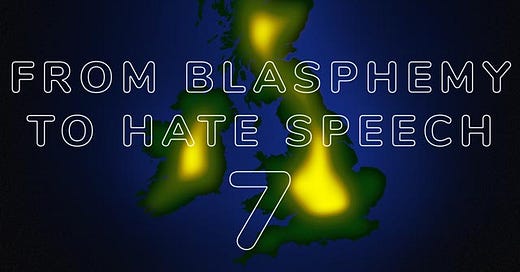(Note: this essay is part of a series.)
After all of this, you might think that the new situation (whether one approves of it or not) must surely be more consistent and rational than the one it replaced. Not at all. Almost all of the criticisms that were made of blasphemy law could just as easily be made of today’s hate speech law.
I believe the following list comprises all of the major criticisms, along with more unusual ones. I have included so many because every one bolsters the case that the weaknesses of the old law have not been overcome by the new law but replicated in it, just in pursuit of a different goal.
Freedom of speech
“The blasphemous libel law restricts freedom of speech. There is no more precious commodity than the right to speak freely. All ideas should be sayable, and in tones as obscene, aggressive and offensive as we choose.”
Today, the people who made that argument forty years ago are making the exact opposite argument regarding so-called “hate speech”, openly celebrating that the laws against it limit freedom of speech. They come out with smug remarks like: “hate speech is not free speech”, “freedom of speech, but not freedom from the consequences of speech”, “nobody owes you a platform”, “toxic ideas and people must be denied a platform” and “there’s no place for hate in our society”. The fundamental point, that they are limiting people’s freedom of speech - either legally or practically - does not bother them in the slightest.
Imposing
“You can’t impose your religion / way of thinking on other people.”
Progressives have systematically colonised academia, government, every political party, every school, and virtually the entire mainstream media in order to impose their way of thinking on the general public. Many of them advocate legal punishment for people who stray from their way of thinking. For example, almost no ordinary person seriously believes that a man can become a woman, or that there are many genders, or that race doesn’t exist, yet very few of them would dare to say so. Progressives are imposing their beliefs on the general public to such an extent that people feel compelled to pretend to be in alignment with their way of thinking.
Respect
“If you want to stop people seeing blasphemous material, it’s because you don’t respect their intellect.”
Progressives have proudly said that the general public do not have the intellect of experts and therefore should not try to work things out for themselves (eg. covid) and should be prevented from finding politically controversial material online since they lack the intellect to handle it, and also that even experts should refrain from engaging with the arguments of “hate-mongers”. All of this is justified on the grounds that such material is “hate speech”, and therefore toxic and untouchable. There is a religious fervour to this that outweighs that of Victorian England.
Freedom of choice
“You are seeking to restrict freedom of choice for the viewer, listener, reader, etc.”
Okay, now let me publish a “racist” novel with Penguin or broadcast a “transphobic” drama on Channel 4. Not only would there be lobby groups campaigning for my arrest, but the government and judiciary would agree with them - on the grounds that such material would be “hate speech”.
Feelings over facts
“It’s all about feelings! Nobody has the right not to be offended! Fuck your feelings!”
This is the thinking popularised by progressives up till about 2000, then taken over by Ricky Gervais, Christopher Hitchens et al (interestingly, they also used it mostly against Christians). After 2000, progressives abandoned the notion and began “caring” very much about people’s feelings (when the people are of a “protected group”). This enabled Ben Shapiro to mock progressives as “fragile snowflakes” in the 2010s, but the real victory was theirs. By making feelings a legal matter, they could implement “hate speech” laws to control, threaten and punish their political enemies.
And suddenly, when the group being protected is not the ancestral majority (White Christians) but foreign newcomers, suddenly… feelings matter. Feelings are intrinsic to dignity, which is a human good. Suddenly we don’t expect people to behave like robots, devoid of feeling and therefore not subject to indignity. But that is what progressives expected of Christians 50 years ago.
Subjective
“Whether something is blasphemous is subjective and open to interpretation.”
The Macpherson report, the seminal 1999 document which laid the ground for Britain’s second generation hate speech laws, explicitly called for a subjective definition of racism to be used in law:
A racist incident is any incident which is perceived to be racist by the victim or any other person.
Scotland’s third generation hate speech law has been criticised for advancing a very subjective definition of “hate speech”:
material that a reasonable person would consider abusive or insulting, and likely to result in hatred being stirred up against a group defined by race, colour, nationality, or ethnic or national origins.
Is that any less vague and subjective than Judge King-Hamilton’s definition of blasphemous libel?
[Publishing] anything concerning God, Christ or the Christian religion in terms so scurrilous, abusive or offensive as to outrage the feelings of any member of or sympathiser with the Christian religion and would tend to lead to a breach of the peace.
The Scottish police force is proud of how open to interpretation the “hate” laws are:
It is important to remember what we are contrasting. None of these bodies are concerned about the subjective nature of “hate speech”, yet one of the Law Commission’s top 3 reasons for abolishing the blasphemy law was that it was subjective. It seems that a law being subjective is absolutely fine, if the powers-that-be find the law useful, but if they don’t, the law’s subjectivity becomes a weakness so crucial that it must be abolished.
Unrealistic expectations
“Something can only be known to be blasphemous ex post facto, once it has actually offended people.”
This was false regarding blasphemy, which is probably why nobody ever makes the same argument regarding “hate speech”. People who utter “hate speech” are held entirely culpable for it, and are expected to have known perfectly well in advance that it was racist, homophobic, transphobic, etc.
Intent does count (see below) but if they did have intent (eg. certain opinions about the relevant group) then they are presumed to have known that what they were saying was indeed offensive, and therefore illegal.
If anything, the standard for culpability in blasphemy cases was higher than in “hate speech” cases today; in blasphemy cases, the defence could always argue that the defendant, even though he has negative opinions of Christianity and said something blasphemous, did not know it was blasphemous. This is the equivalent, today, of someone known for transphobia being let off for saying something transphobic on the grounds that he didn’t know it was transphobic. No magistrate would accept such a defence.
The Streisand effect
“The blasphemy law is counter-productive for those who advocate it, since it publicises blasphemous material which would otherwise go unnoticed by most people.”
Try making that argument today when you’re in court for saying something racist. Your tweet was only seen by 70 people, whereas the newspaper articles about your trial quote that tweet and are seen by 700,000 people… but the anti-“hate” activists will think this is right. They care about the principle and about “sending a message” - exactly the attitude for which these same people pilloried Mary Whitehouse.
Keep reading with a 7-day free trial
Subscribe to Millennial Woes to keep reading this post and get 7 days of free access to the full post archives.








